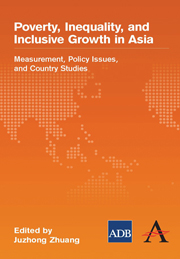Book contents
- Frontmatter
- Contents
- Foreword
- Preface and Acknowledgments
- Contributors
- Abbreviations, Acronyms, and Symbols
- Tables, Figures, and Boxes
- 1 Poverty, Inequality, and Inclusive Growth in Asia
- Part A Measuring Inequality and Poverty
- Part B Selected Policy Issues for Inclusive Growth
- 5 Inclusive Growth through Full Employment: The Role of Investment and Industrial Policy
- 6 Why is Access to Basic Services Not Inclusive?
- 7 Social Protection in Asia
- 8 Governance and Institutional Quality and the Links with Growth and Inequality: How Asia Fares
- Part C Country Studies
- Index
6 - Why is Access to Basic Services Not Inclusive?
from Part B - Selected Policy Issues for Inclusive Growth
Published online by Cambridge University Press: 05 March 2012
- Frontmatter
- Contents
- Foreword
- Preface and Acknowledgments
- Contributors
- Abbreviations, Acronyms, and Symbols
- Tables, Figures, and Boxes
- 1 Poverty, Inequality, and Inclusive Growth in Asia
- Part A Measuring Inequality and Poverty
- Part B Selected Policy Issues for Inclusive Growth
- 5 Inclusive Growth through Full Employment: The Role of Investment and Industrial Policy
- 6 Why is Access to Basic Services Not Inclusive?
- 7 Social Protection in Asia
- 8 Governance and Institutional Quality and the Links with Growth and Inequality: How Asia Fares
- Part C Country Studies
- Index
Summary
Introduction
Many consider the provision of basic social services, such as schooling and health care, both the ends and means of economic development. Education is commonly viewed as an important dimension of human development in Asia, while a shortage of skilled labor is often cited as a growth constraint in many countries or sectors. Delivery of basic services therefore has attracted considerable attention from national governments, development agencies, nongovernment organizations (NGOs), and the research community.
Despite the greater supply of basic services in developing Asia and beyond, evidence shows that the poor have failed to gain sufficiently from it. This chapter therefore explores the causes of such failures. Section 6.2 provides a brief account of the current state of service delivery in developing countries, with a special focus on Asia. Section 6.3 presents a synthesis of the barriers the poor face in accessing various services, with boxes highlighting good practices in pro-poor service delivery in developing countries. Section 6.4 summarizes and concludes.
Unequal access to basic services: A brief account
Developing countries and development institutions in the past 2 decades have increased efforts to improve the quality and accessibility of basic social and infrastructure services and to make them more inclusive. But outcomes have been mixed: while some have been successful, others have benefited the rich more than the poor. And in many communities in the developing world, the poor still lack adequate access to basic services (O'Donnell et al. 2007).
Information
- Type
- Chapter
- Information
- Poverty, Inequality, and Inclusive Growth in AsiaMeasurement, Policy Issues, and Country Studies, pp. 199 - 227Publisher: Anthem PressPrint publication year: 2010
Accessibility standard: Unknown
Why this information is here
This section outlines the accessibility features of this content - including support for screen readers, full keyboard navigation and high-contrast display options. This may not be relevant for you.Accessibility Information
- 4
- Cited by
